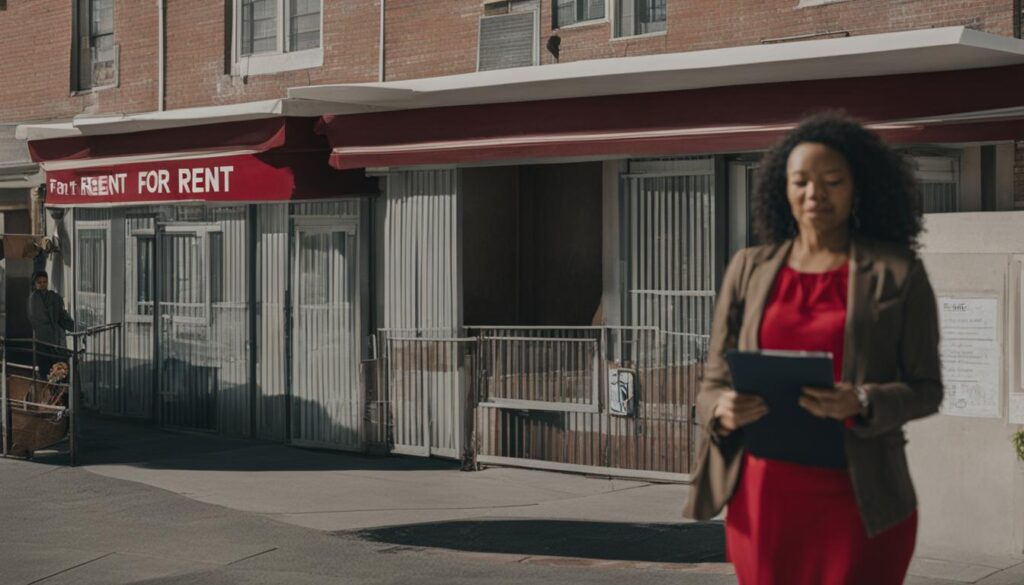
As a tenant, understanding and negotiating lease agreements is essential to ensure a favorable rental arrangement. Whether you’re renting an apartment or commercial space, navigating the complexities of lease terms can seem overwhelming. In this tenant’s guide, I will provide you with valuable information and strategies to help you understand and negotiate lease agreements effectively.
Key Takeaways:
- Understanding lease agreements is essential for tenants to protect their rental future.
- Lease agreements often contain various clauses that tenants should carefully review.
- Effective communication and strategic decision-making are crucial for successful lease negotiation.
- Seeking legal advice and maintaining thorough documentation can provide added protection.
- By following these tips and being proactive, tenants can ensure a smooth and successful leasing experience.
Understanding Lease Agreement Clauses
Lease agreements often contain various clauses that tenants should understand before signing. These clauses outline the terms and conditions of the lease, dictating the rights and responsibilities of both the landlord and the tenant. By familiarizing yourself with these clauses, you can make informed decisions and ensure a smooth leasing experience.
1. Rent Payment Clause
The rent payment clause specifies the amount of rent due, the due date, and the acceptable methods of payment. It is crucial to review this clause to avoid any confusion regarding rent obligations and late fees.
2. Maintenance and Repairs Clause
The maintenance and repairs clause outlines the responsibilities of the landlord and the tenant regarding property upkeep. It is essential to understand who is responsible for maintenance tasks and to report any damages or repairs needed during the tenancy.
3. Entry and Privacy Rights Clause
The entry and privacy rights clause defines when and under what circumstances the landlord may enter the rental property. Understanding your rights to privacy and the landlord’s obligations regarding notice is crucial for maintaining a comfortable living environment.
4. Termination and Renewal Clause
The termination and renewal clause specifies the conditions under which the lease can be terminated by either party. It also outlines the procedures for lease renewal or the transition to a month-to-month agreement. Reviewing this clause can help you plan your long-term housing arrangements more effectively.
These are just a few examples of common lease agreement clauses. It is crucial to read and understand each clause thoroughly before signing the lease. If you have any questions or concerns, don’t hesitate to seek clarification from the landlord or consult with a legal professional.
Tips for Successful Lease Negotiation
When it comes to negotiating a lease, effective communication and strategic decision-making are key. Follow these tips to navigate the negotiation process successfully:
- Research the Rental Market: Before entering into lease negotiations, conduct thorough research on the current rental market in your area. This will give you an idea of the average rental rates and help you determine if the landlord’s proposed terms are fair and competitive.
- Define Your Priorities: Identify your top priorities and non-negotiables for the lease agreement. This could include factors such as lease term, rent amount, pet policies, maintenance responsibilities, and renewal options. Having a clear understanding of your must-haves will allow you to focus your negotiation efforts on the areas that matter most to you.
- Prepare a Proposal: Develop a well-thought-out proposal that outlines your desired lease terms and highlights the benefits for both parties. Consider including specific language and clauses that protect your rights and address any concerns you may have.
- Remain Professional and Polite: Effective negotiation requires professionalism and tact. Keep in mind that the landlord or property manager is also looking to secure a mutually beneficial agreement. Maintain a respectful tone throughout the negotiation process, even when discussing areas of disagreement.
- Be Flexible and Open to Compromise: Negotiation is a give-and-take process. While it’s important to advocate for your needs, be willing to consider alternative proposals from the landlord. Finding a middle ground that satisfies both parties can lead to a more successful negotiation outcome.
- Seek Legal Advice if Necessary: If you encounter complex lease terms or legal language that you’re unsure about, don’t hesitate to seek legal advice from a qualified attorney specializing in real estate law. They can provide guidance and ensure that your rights and interests are protected.
- Document All Communication: Throughout the negotiation process, keep a record of all written communication, such as emails or letters, as well as any verbal agreements. This documentation will serve as evidence in case of any disputes or misunderstandings in the future.
- Review the Final Agreement Carefully: Before signing the lease, carefully review the final agreement to ensure that all negotiated terms are accurately reflected. Don’t hesitate to ask questions or seek clarification on any sections that may be unclear or ambiguous.
- Get Everything in Writing: Once the lease is finalized, make sure to get all agreed-upon terms in writing. This includes any amendments, concessions, or special arrangements discussed during the negotiation process. Having everything documented will help protect both parties and avoid future misunderstandings.
Effective Negotiation Strategies
When negotiating a lease, employing effective strategies can significantly improve your chances of reaching a favorable outcome. Consider the following strategies:
- Anchor your starting point: Begin the negotiation by proposing terms that are slightly more favorable to you than what you ultimately desire. This allows room for concessions and gives the impression that you are willing to compromise.
- Highlight your strengths: Emphasize your positive qualities as a tenant, such as a stable income, good credit history, or excellent references. This can strengthen your bargaining position and make the landlord more inclined to agree to your requests.
- Offer alternatives: If the landlord is unwilling to agree to certain terms, suggest alternative solutions that still meet your needs. This demonstrates your flexibility and willingness to find a mutually agreeable solution.
- Use data to support your case: Gather data on similar rental properties in the area to support your proposed rental rate or terms. Concrete evidence can be persuasive and lend credibility to your negotiation efforts.
By following these lease negotiation tips and employing effective negotiation strategies, you can increase your chances of securing a lease agreement that aligns with your needs and protects your interests.
Conclusion
Negotiating a lease agreement can be a complex process, but armed with the right knowledge and approach, you can secure a favorable rental arrangement. As a tenant, it is important to take proactive steps to protect your interests and ensure a smooth leasing experience.
One crucial aspect is carefully reviewing the lease terms. Take the time to thoroughly understand each clause and its implications. Pay attention to important details such as the lease duration, rent amount, security deposit, and any restrictions or obligations that may be included.
Effective communication is key during lease negotiation. Clearly and assertively articulate your needs and concerns to the landlord or property manager. Consider requesting any modifications or additional terms that are important to you. Remember, negotiation is about finding a mutually beneficial agreement.
Seeking legal advice when necessary can provide added protection and assurance. If you are unsure about any aspect of the lease agreement, consult with a qualified attorney specializing in real estate law. They can help you navigate any legal complexities and ensure that your rights are safeguarded.
Lastly, maintaining thorough documentation throughout the negotiation process is crucial. Keep copies of all correspondence, lease drafts, and any agreed-upon changes. This documentation will serve as evidence of the agreed-upon terms and protect you in case of any disputes or misunderstandings down the line.
In conclusion, by carefully reviewing lease terms, effectively communicating your needs, seeking legal advice when necessary, and keeping comprehensive records, you can negotiate a lease agreement confidently. This tenant’s guide wrap-up aims to equip you with the tools and knowledge to secure a favorable lease agreement and enjoy a successful rental experience.
FAQ
What should I consider when negotiating a lease agreement?
When negotiating a lease agreement, it is important to carefully review the terms, understand important clauses, and effectively communicate your needs. Seeking legal advice when necessary and keeping thorough documentation can provide added protection.
What are some common lease clauses and their implications?
Lease agreements often contain various clauses that tenants should understand before signing. Some common lease clauses include the security deposit clause, maintenance and repairs clause, pet policy clause, and lease termination clause. It is important to understand the implications of these clauses to ensure a favorable rental arrangement.
How can I navigate the lease negotiation process successfully?
Negotiating a lease requires effective communication and strategic decision-making. Some tips for successful lease negotiation include researching market rental rates, understanding your rights as a tenant, being prepared to compromise, and considering a longer lease term for possible rent concessions.









